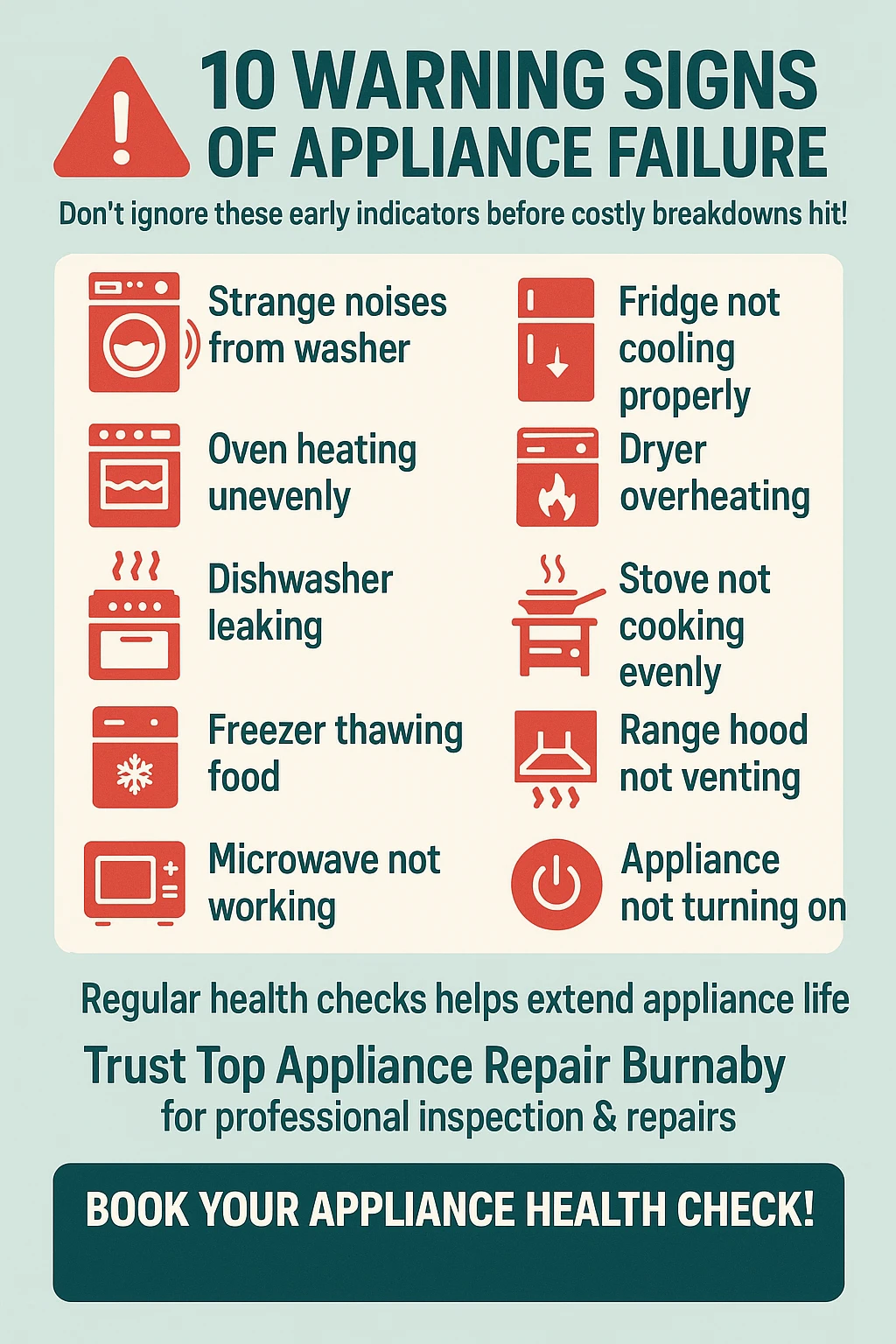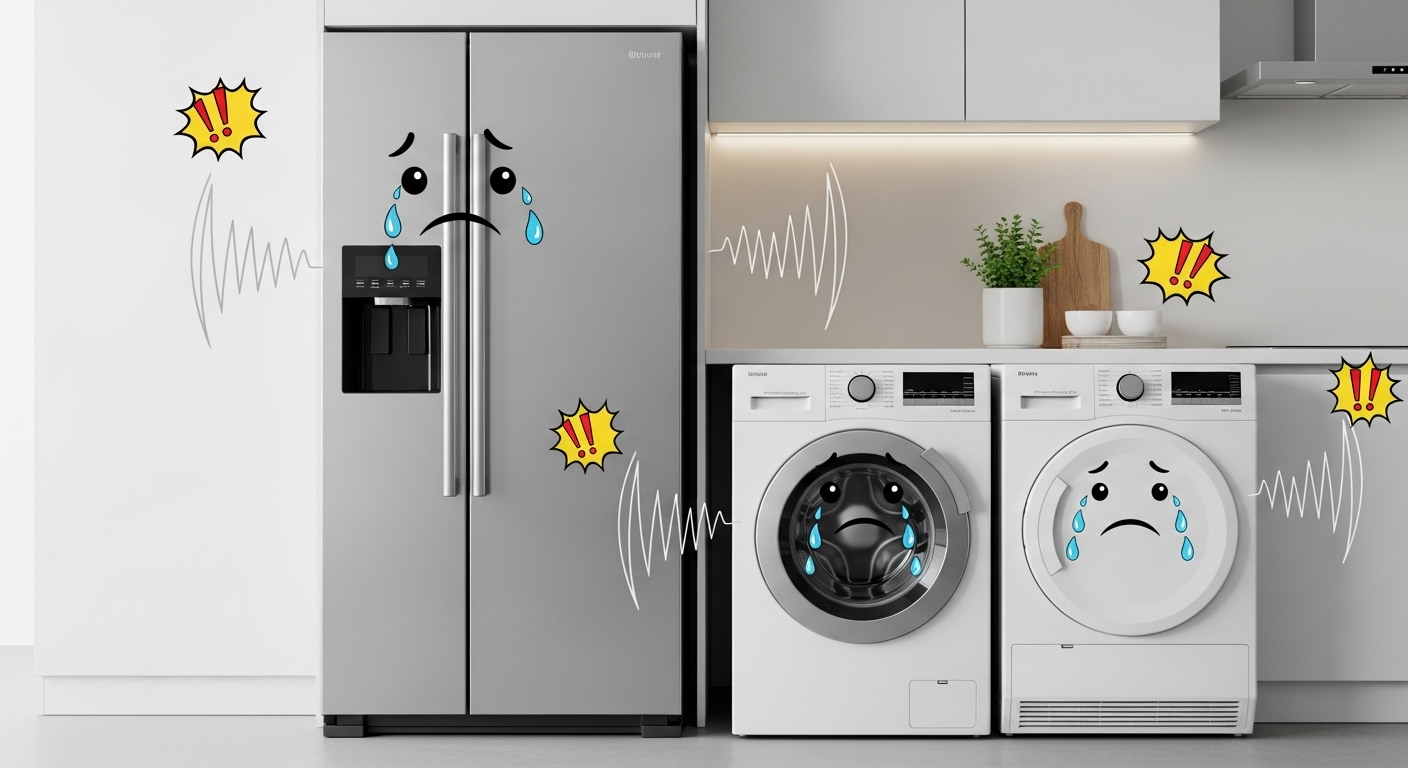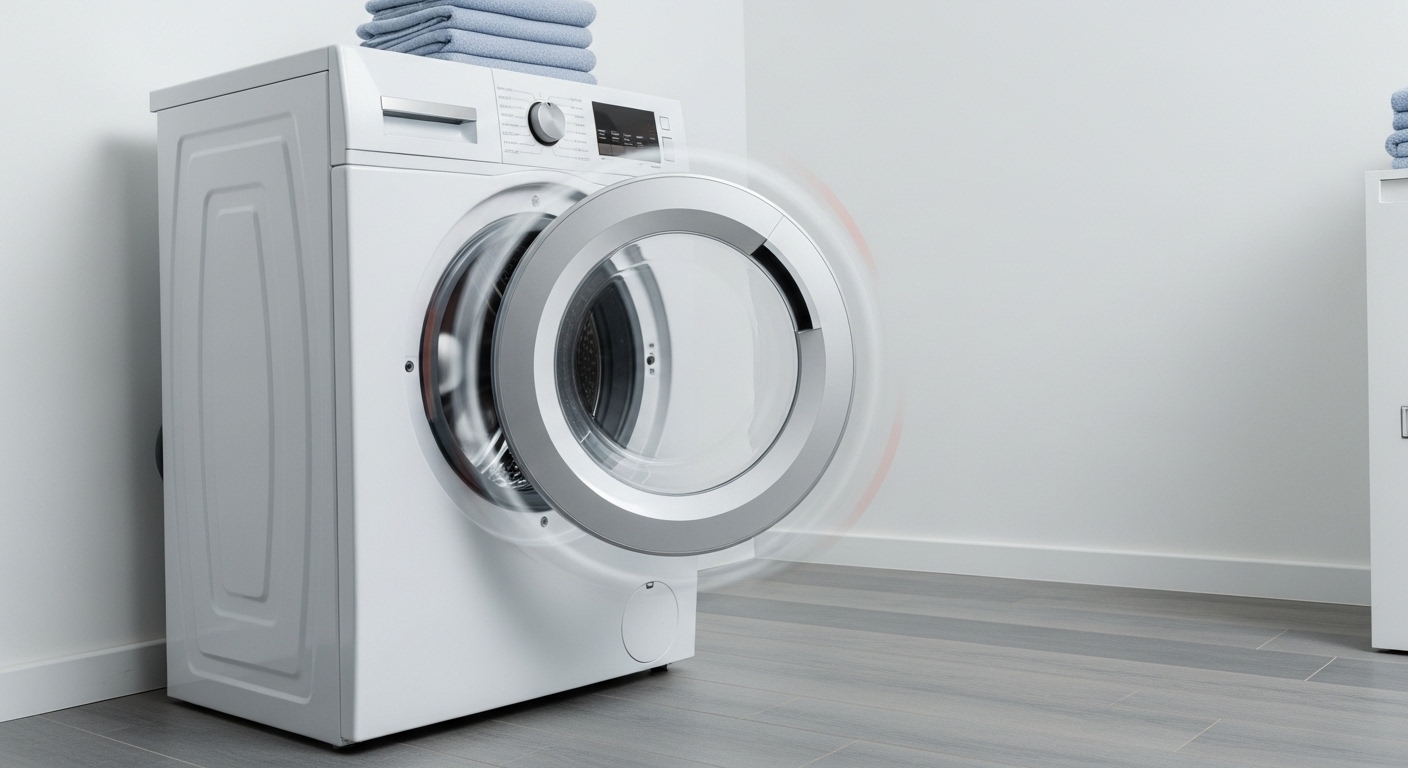Appliance Health Check: 10 Warning Signs Your Home Appliances Are Crying for Help Before They Break Down
Ever wondered why your fridge started making that weird humming sound, or why your dryer takes twice as long to finish a cycle? Your appliances are actually trying to communicate with you through these subtle (and not-so-subtle) warning signs, and ignoring them could cost you big time!
Picture this: it’s a typical rainy Tuesday morning in Burnaby, and you’re rushing to get ready for work. You throw your clothes in the dryer, expecting them to be ready in an hour, but instead, you come back to find them still damp. Or maybe you open your fridge to grab lunch ingredients, only to discover that your milk has gone bad because the temperature hasn’t been consistent. Sound familiar? These scenarios happen to thousands of homeowners every day, and they’re usually preventable.
The truth is, most major appliance breakdowns don’t happen overnight. Your washing machine, dishwasher, refrigerator, and other household essentials typically give you plenty of warning signs before they completely give up. The problem is that most of us are either too busy to notice these signals or we dismiss them as minor quirks that will somehow fix themselves. Spoiler alert: they won’t.
Think of appliance maintenance like going to the dentist. Sure, you could skip those regular checkups and hope for the best, but eventually, that small cavity becomes a root canal situation. Similarly, that slightly louder-than-usual noise from your dishwasher could be telling you about a worn-out pump that, if addressed early, might cost you $150 to fix. Ignore it, and you could be looking at a $800 replacement or dealing with a flooded kitchen at the worst possible moment.
Key Outtakes:
- Regular appliance health checks can prevent 80% of unexpected breakdowns and extend appliance lifespan by up to 50%
- Strange noises, performance drops, and increased energy bills are the three most reliable early warning signs
- Professional appliance inspections every 6-12 months can save hundreds of dollars in repair costs
- Simple monthly maintenance tasks can significantly improve appliance efficiency and prevent major failures
- Ignoring early warning signs often leads to safety hazards and more expensive replacements

Understanding Appliance Health Assessment Fundamentals

Before we dive into the specific warning signs, let’s talk about why appliances develop problems in the first place. Just like your car needs oil changes and brake inspections, your household appliances experience wear and tear from daily use. Every time you start your dishwasher, run a load of laundry, or open your refrigerator door, various mechanical components are working together to make magic happen.
The science behind appliance degradation is actually pretty fascinating. When a commercial appliance starts producing strange noises—such as rattling, grinding, or humming—it’s often a sign of internal mechanical stress. The same principles apply to your home appliances, just on a smaller scale. Motors, belts, pumps, and heating elements all have finite lifespans, but proper maintenance can significantly extend their useful life.
Here’s where it gets interesting for us Burnaby folks: our coastal climate actually plays a bigger role in appliance health than most people realize. The humidity levels we experience throughout the year can affect everything from refrigerator efficiency to dryer performance. During those damp winter months, your appliances might work harder to maintain optimal performance, while summer heat can put additional stress on cooling systems.

Regular home appliance maintenance can extend the life of your appliances and save you hundreds—if not thousands—of dollars in repairs. But here’s the kicker: most homeowners have no idea what “regular maintenance” actually means. It’s not just about cleaning the lint trap in your dryer (though that’s super important too). We’re talking about a systematic approach to monitoring your appliances’ health, kind of like having a fitness tracker for your household equipment.
The modern smart home revolution has actually made appliance health monitoring easier than ever. Many newer appliances come with built-in diagnostic capabilities that can alert you to potential problems through smartphone apps. But even if you’re rocking some older models, there are plenty of low-tech ways to keep tabs on their condition. The key is knowing what to look for and when to take action.
The Top 10 Warning Signs Your Appliances Need Immediate Attention
Now that we’ve covered the basics, let’s get into the nitty-gritty of appliance health diagnosis. Think of yourself as a detective, and your appliances are suspects that might be planning their great escape. The clues are all there; you just need to know how to read them.
The beauty of early detection is that it puts you in control of the situation. Instead of waking up to a flooded laundry room or discovering that your freezer turned into a science experiment overnight, you can schedule repairs at your convenience and often at a fraction of the emergency service cost.
Strange Noises and Vibrations
Let’s start with the most obvious signs: weird sounds. Every appliance has its normal operational soundtrack, and when that changes, it’s time to pay attention. Thumping sounds from washers may mean an unbalanced load or worn bearings. Buzzing from a fridge could signal a compressor problem. Squealing from dryers often points to a bad belt or motor. I learned this the hard way when my washing machine started making a sound like a helicopter landing in my basement. Turns out, the bearings were shot, and what could have been a $200 repair became a $600 replacement because I ignored it for months.

Vibrations are equally telling. If your dryer suddenly starts doing a dance across the laundry room floor, or your dishwasher is shaking the entire kitchen cabinet, something’s definitely not right. These movement patterns usually indicate internal component wear or improper installation issues that have developed over time.
The key is distinguishing between normal operational sounds and concerning changes. New homeowners often worry about every little noise, while longtime residents might become so accustomed to gradual changes that they miss important warning signs. Take a moment each month to actually listen to your appliances during their cycles. Yes, I know it sounds weird, but this simple practice can save you thousands.
Performance Degradation Patterns
Performance issues are often the first signs that your appliances are struggling. Commercial kitchen appliances are built for performance, and when they start lagging, it’s a sign they need attention. The same principle applies to your home equipment. If your dishwasher used to get everything sparkling clean and now you’re finding spots on glassware, or if your dryer cycles are taking longer than usual, these are red flags.
Refrigerator performance issues are particularly tricky because they happen gradually. You might not notice that your milk is expiring a day earlier than it used to, or that ice cream is slightly softer than normal. But these subtle changes often indicate temperature regulation problems that, left unchecked, can lead to compressor failure.
For washing machines, watch for clothes that aren’t getting as clean as they used to, or fabric that comes out with a musty smell even after a full wash cycle. These issues can indicate problems with water temperature, drainage, or detergent dispensing systems. Don’t just switch to a stronger detergent and call it good; investigate the root cause.
Unusual Odors and Smells
Your nose is one of your best diagnostic tools when it comes to appliance health. A burning smell from an appliance can indicate overheating or electrical issues, which can be dangerous and should be addressed immediately. But not all concerning smells are dramatic. Sometimes it’s a subtle metallic odor from your dishwasher, or a slightly musty smell from your washing machine that indicates brewing problems.
Gas appliances deserve special attention in the smell department. Any hint of gas odor around your stove, dryer, or water heater should trigger an immediate response: turn off the appliance, ventilate the area, and call a professional. Don’t try to troubleshoot gas issues yourself; the risks are just too high.
Refrigerators can develop interesting smells that aren’t related to forgotten leftovers. A chemical or ammonia-like odor could indicate refrigerant leaks, while a burning smell might suggest motor problems. These issues rarely resolve themselves and typically worsen over time, potentially creating food safety hazards.